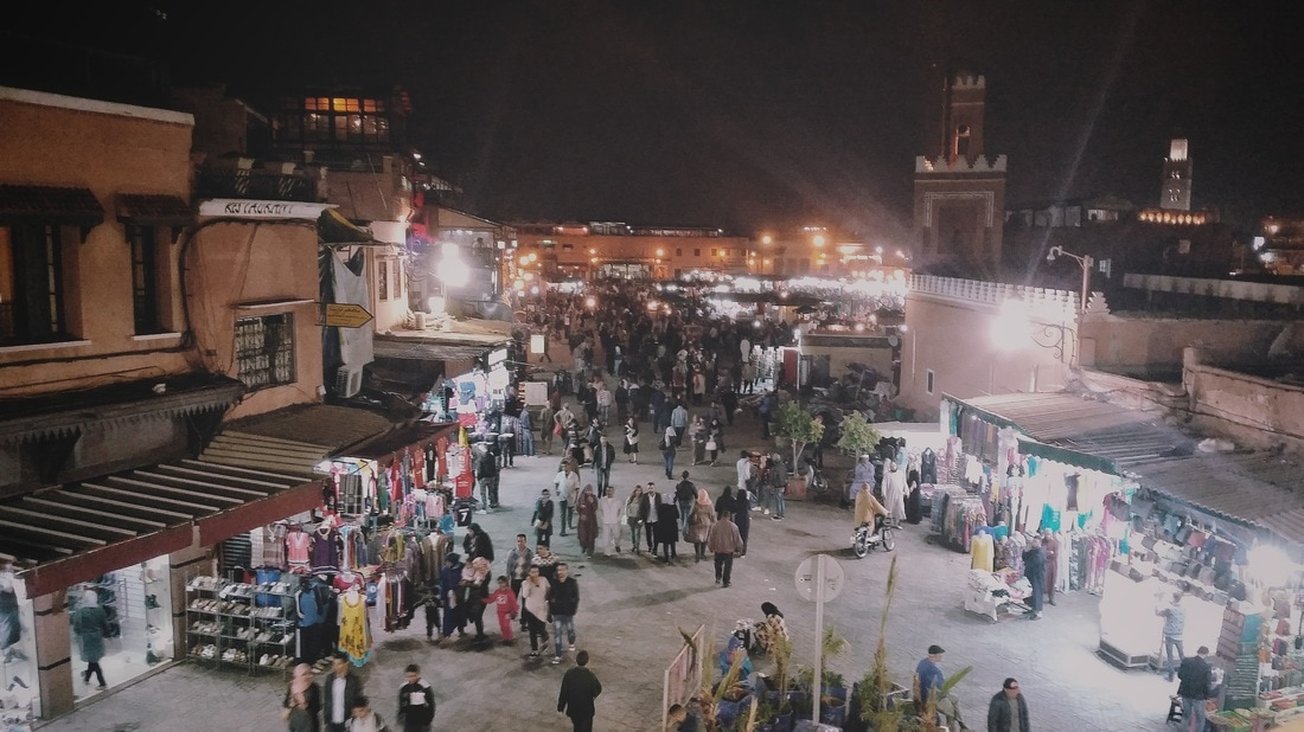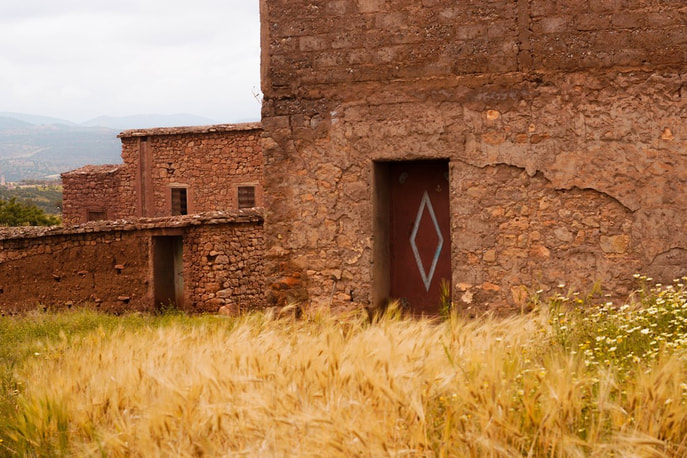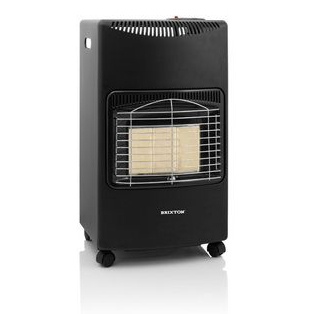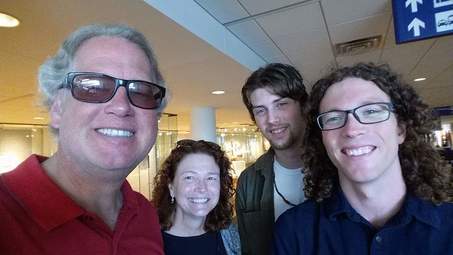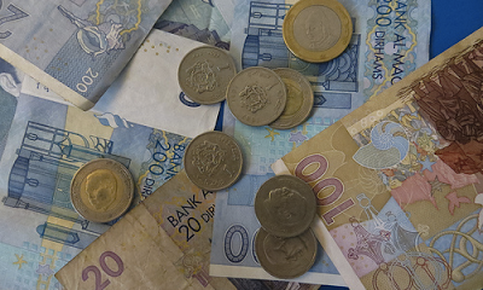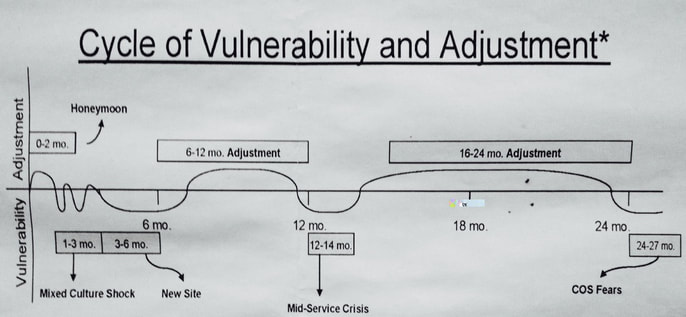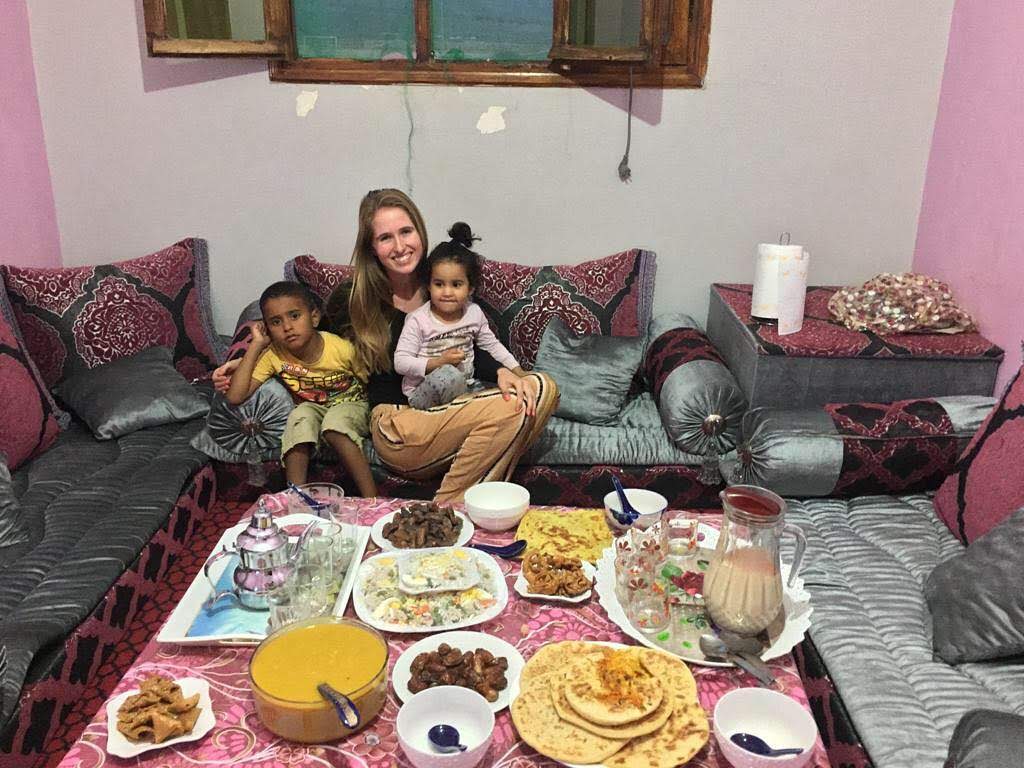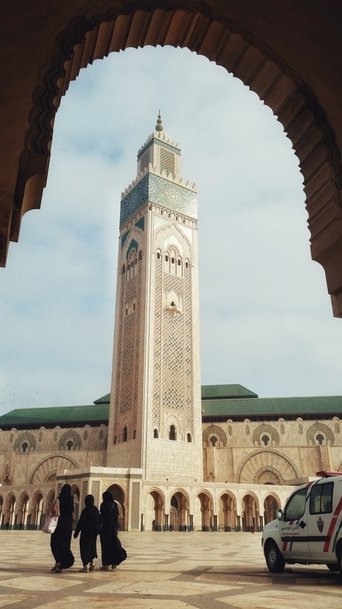|
What's life like in Peace Corps Morocco? Well, it's just like home in America. We work, we have houses, we shop, we deal with the hot and cold, we have pets, we see friends.
It's just a little different. Not better, not worse, just different. How different? Well, when you start living here, it may feel very different. But after a few months, it will feel like home, with only occasional reminders that you live in a foreign country. |
Photo by Cassandra Broadwin
|
work
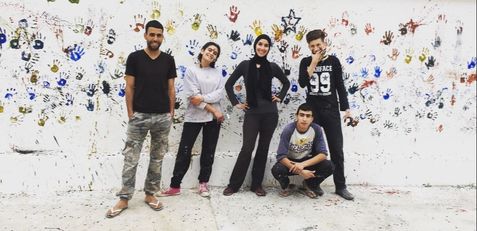 Photo: Sara Amer
Photo: Sara Amer
The format of work here is relatively simple in that we teach English or run clubs on a daily basis, depending on when your students are available. Many associations and dar shababs are usually open in the morning until noon, then reopen from 4:00 until 8:00 p.m. Schools are open 8:00-12:00 and 2:00-4:00 from Monday through Saturday, generally speaking.
The director of a dar shabab (mudir or mudira) may simply unlock the front door of the building. However, some directors will be very involved and will help organize events or put you into contact with associations or individuals that will help you do your work.
If you are in a new site, you may have to build attendance in your work sites, while older sites may already have regular students. Your classes may have two students, or they may have 30-40. You may also teach elementary school aged kids, or all the way up to working professionals in their 50's. Some people will already know English, some might not even know the alphabet. There is no way to know until you start. For this reason, you may need to teach multiple classes tailored to the needs of each.
There are also many students who are in high school that are studying for the BAC, a university entrance exam. A part of this test is in English. As a result, students may want a study session just for them. The classes they take in school are heavy on grammar and writing, and less on communication. In fact, they may speak very little English, but will interrogate you about why you don't know past progressive tense, passive voice, or first and second conditionals.
The director of a dar shabab (mudir or mudira) may simply unlock the front door of the building. However, some directors will be very involved and will help organize events or put you into contact with associations or individuals that will help you do your work.
If you are in a new site, you may have to build attendance in your work sites, while older sites may already have regular students. Your classes may have two students, or they may have 30-40. You may also teach elementary school aged kids, or all the way up to working professionals in their 50's. Some people will already know English, some might not even know the alphabet. There is no way to know until you start. For this reason, you may need to teach multiple classes tailored to the needs of each.
There are also many students who are in high school that are studying for the BAC, a university entrance exam. A part of this test is in English. As a result, students may want a study session just for them. The classes they take in school are heavy on grammar and writing, and less on communication. In fact, they may speak very little English, but will interrogate you about why you don't know past progressive tense, passive voice, or first and second conditionals.
shopping
Like everything in Morocco, the way you shop depends greatly on your site. Your neighborhood weekly market (the souk) is where you can buy fresh fruit and vegetables as well as clothes and other random things. Most sites have these, but not all. PCVs without them will have to travel to a nearby site or they may have a produce 7anut (store) or two which may not be open every day. If you end up in a site like this, you have to plan ahead a lot. Some of the bigger sites even have daily markets along with a bigger weekly one.
7anuts are just stores, similar to convenience stores. They are generally everywhere and most of them sell the same things as the 7anut next to them, with only small variations. Over time, you will learn which 7anut has what. Usually, they all have most of what you need on a daily basis, like bread, pasta, nuts, tomato paste, toilet paper, snacks, soda, eggs, milk, yogurt, juice, light bulbs, propane tanks, and the like.
The largest of sites have supermarkets, which are basically exactly like any large supermarket in America, with things such as food, home appliances, some clothing, pet food, home furnishings, and decorations. PCVs without them will often go to them while traveling and bring things back to site.
7anuts are just stores, similar to convenience stores. They are generally everywhere and most of them sell the same things as the 7anut next to them, with only small variations. Over time, you will learn which 7anut has what. Usually, they all have most of what you need on a daily basis, like bread, pasta, nuts, tomato paste, toilet paper, snacks, soda, eggs, milk, yogurt, juice, light bulbs, propane tanks, and the like.
The largest of sites have supermarkets, which are basically exactly like any large supermarket in America, with things such as food, home appliances, some clothing, pet food, home furnishings, and decorations. PCVs without them will often go to them while traveling and bring things back to site.
houses
Some volunteers live in houses made of mud and straw, but this is definitely the exception rather than the rule. Volunteer houses are likely nicer than what you'd expect. They are usually made of cinder block and cement (painted over), and often have tile covering some or all of the walls, as well as the floors (this is important when packing, as hanging things from the walls can be difficult, so bring some wall tack or tape). The floors are cement or tile (no carpet here), although floor covers are easy to find. Houses are designed so that cleaning the floor is often done by dumping a bucket of water onto the floor and then squeegeeing it to a recessed drain or out the door. Mops and vacuums as we know them are rarely used. Rather than too small, the houses are usually made for a family to live in, so most volunteers have a spare room or two that is virtually unused or is used as a junk room.
utilities

Electricity
Because Morocco's infrastructure is developing gradually, electricity is in all sites and is generally reliable. The power is the same voltage as continental Europe, using the two-pin Europlug. Bring with you a few adapters. Some outlets are recessed, while some are flat with the wall, and some have a third grounding pin in the wall. You will need adapters that can either use the grounding pin, or ones that can avoid them altogether (like the photo above). You can also find adapters for USB-powered devices. You will want to make sure all of your electronics can support 220 V power input. Look at your electronics and they will list the electricity input as 100-120V, or 100-240V. You will need ones that say 100-240V. Most electronics support this. If you are bringing something that doesn't support dual-voltage, however, you will also need to bring a power converter. Otherwise, that electronic device can and probably will be damaged. If everything does support dual-voltage, you do not need to bring a power converter. Cooking
Although electronic stoves and ovens can be found, the overwhelming majority of them use propane. They don't have built-in igniters, so this has to be done with a lighter. Installing and using them properly has to be done with care, as CO poisoning can happen without you realizing it. Peace Corps gives you a smoke/CO detector and their importance cannot be stressed enough. Peace Corps also trains you on how to use, install, and check for leaks. However, if given the opportunity, you may want to practice this with home grills before coming to Morocco. |
Water
In almost all current PCV sites, water is safe to drink, though it may not taste very good. If you have a particularly sensitive stomach, sticking to bottled water (available everywhere in bottles ranging from a quarter liter to five liters) is a good idea. But it should be noted that the water in Morocco is treated, the main problem being that it contains different levels of minerals than you might be used to. As a result, many volunteers experience gastrointestinal issues for the first number of months in country, but ultimately acclimate and regularly drink tap water. However, since all sites are different, you will need to ask people in your community if they themselves drink the water. Bottom line: only you know how your stomach handles change. Heaters
Propane is also used for many space heaters and water heaters, although electric ones can be found for both. The same care must be taken as with stoves and ovens. |
Phone
Peace Corps will give you a simple smart phone or, if you'd prefer to use your own unlocked phone, a Morocco SIM card. Our mobile phone carrier, Maroc Telecom, has coverage throughout Morocco. The phone plan allows us to call other PCVs at no cost and ten hours of calling to other phones each month. We also receive 3GB of data each month.
Peace Corps will give you a simple smart phone or, if you'd prefer to use your own unlocked phone, a Morocco SIM card. Our mobile phone carrier, Maroc Telecom, has coverage throughout Morocco. The phone plan allows us to call other PCVs at no cost and ten hours of calling to other phones each month. We also receive 3GB of data each month.
Internet
Internet is available in three ways: Wi-Fi, USB modem, and your smart phone (covered above). Wi-Fi is not only available at the majority of cafes in Morocco (there are a lot, though women will feel less comfortable at them), but can also be purchased for your house in most sites. It's as good as any high-speed internet connection in America at 200 dirhams a month (around $20). At half the price, however, you can get a USB modem from one of the phone providers. These modems use the same 3G networks as the phones, so the speed makes downloading files or streaming videos an arduous process, but have the benefit of being able to be taken anywhere you go. Video chatting can generally be done, but the quality might be lacking, as well as the reliability.
Internet is available in three ways: Wi-Fi, USB modem, and your smart phone (covered above). Wi-Fi is not only available at the majority of cafes in Morocco (there are a lot, though women will feel less comfortable at them), but can also be purchased for your house in most sites. It's as good as any high-speed internet connection in America at 200 dirhams a month (around $20). At half the price, however, you can get a USB modem from one of the phone providers. These modems use the same 3G networks as the phones, so the speed makes downloading files or streaming videos an arduous process, but have the benefit of being able to be taken anywhere you go. Video chatting can generally be done, but the quality might be lacking, as well as the reliability.
|
Talking to friends and family back home
Phones can be used to call the States, too, but is very expensive. Of course, incoming calls to your phone cost you nothing. Many PCVs had Google Voice accounts back home, which, if kept active, will allow you to call U.S. phones at no cost via internet. Others buy unlimited U.S. calling via Skype or other service. |
Getting paid
|
When you get here, you will be given a bank account and an ATM card. While most sites have a bank, they might not have your bank, which will lead to ATM fees when withdrawing. Using your bank's ATM, you can check your balance and withdraw money.
For your bank accounts back home, you can definitely use them when needed, although Peace Corps encourages living within the means of your monthly allowance which is currently (2019-2020) about 2900 dirhams per month (around $290). Make sure your PIN is only four digits long, and if you are looking to open a new account before leaving, your priority should be to have the lowest international ATM withdraw fees and currency exchange rates as possible. |
computers, tablets, smartphones
Your service as a Peace Corps Morocco volunteer can certainly be done without a computer, but having one will make life easier. There are forms that must be filled out and e-mailed regularly, as well as bi-annual reports of your work (which uses Microsoft Silverlight). These can be done at internet cafes, but not without frustration. On the off-hand chance that your site doesn't have Wi-Fi available for the house, tablets like iPad will be essentially worthless, unless you can tether them to your phone. Many people have iPhones or Android phones that they don't use with the SIM card, making them essentially iPod Touches. Even without the constant access to a network, they are generally very useful for staying in contact with people, as well as for the many apps that work offline, like French and Arabic dictionaries and apps for reading books.
Be aware that the severe changes in weather throughout Morocco often take their toll on electronics.
Be aware that the severe changes in weather throughout Morocco often take their toll on electronics.
hot? Cold?
Morocco is often referred to as the coldest of the hot places. The summers can be oppressively hot (reaching 120 degrees Fahrenheit for weeks at a time), particularly in the South, and the winters bitterly cold, even in most places in the South. In both cases, the main problem is not that you have to deal with it only outside, but inside as well. There is no climate control except in nicer hotels, and inside houses can often be colder than outside. Although the winter temperatures might only hover just above freezing (in the 30s or 40s, a temperature seemingly easy if you come from a northern state), you realize how little time you spend in it in the States, and the inability to escape it in Morocco can cause you to be irritable and perpetually frustrated. Volunteers often sleep with many layers of clothes, can see their breathe when in bed, and sleep with a sleeping bag in addition to blankets. Summers can be equally trying, as you will often sweat when you don't have a fan blowing on you, although some volunteers have ingeniously constructed swamp coolers.
mental health
Service can be a very emotional experience. Not only do you go through broad ups and down, as can be seen here, but you can find yourself experiencing soaring highs and disheartening lows multiple times per day, especially during PST and at the beginning of your service. This does eventually level out to a large extent. Most volunteers deal with this by abusing their unlimited calling plans to each other, or doing things at home that make us happy. In light of that, bring with you things that make you happy and will make your house home. You will have a lot of time alone in your house, so do anything you can to make it a sanctuary from an emotional day.
Pets
Many PCVs do, in fact, have cats as pets (dogs are not allowed). Usually, they are simply found as kittens on the street and are taken home. This can be both a rewarding and meaningful part of your service (not to mention helpful in keeping you sane), but it can also be a huge source of stress trying to deal with vaccines, neutering or spaying, feeding, and finding people to watch and feed them while you're away. The difficulties are compounded when you live in a city a long way from the nearest vet. Pets are not particularly common in Morocco, so expect a lot more attention if you get one. Most PCVs find a way to take their pet home at the end of their service, while many find a new PCV to assume responsibility for them.
fasting in ramadan
|
A challenge that many Peace Corps Morocco volunteers face (and also look forward to) is Ramadan. Ramadan is celebrated as the month in which the prophet Mohammed received the first of the revelations that make up the Quran. Ramadan begins with the sighting of the new moon, so the beginning of Ramadan can vary by country and it moves up 11 days each year. In 2018 and 2019 it began on May 16 and May 6, respectively. The Ramadan fast is one of the five pillars of Islam, as devout Muslims abstain from food and drink from dawn until sundown. After sundown, the fast is broken with celebrations and food.
Many Peace Corps Volunteers participate in the daily fast; it demonstrates an appreciation for their respective communities, and it better connects volunteers to the daily life of neighbors and counterparts. The daily fast is broken with a meal (lftur), often milk, dates, harira, and juice. Your neighbors will likely ask you to join them in breaking the fast. Dinner comes later in the night. PCVs should expect their daily routine to change dramatically: more late night activity and less daytime activity. Because work is not always available during Ramadan, some volunteers travel during this time. However, many also consider this an invaluable time for integration. |
travel & vacationYou are given two days of vacation each month of service (this excludes PST), meaning you will have 24 days each year and 48 over the course of your service. By any standard, this is a generous amount. In addition, you choose your weekly schedule, meaning you have the freedom to travel to nearby sites without using vacation days.
Aside from weekend travel, your supervisor at your assigned work site (dar shabab, nadi neswi, school, etc.) must approve your requested time off. You must also get approval from your Peace Corps regional manager (two days in advance for in-country travel or two weeks in advance for international travel). Travel is forbidden to countries with a State Department travel advisory, or where another Peace Corps Country Director forbids it (e.g. there are upcoming elections in that country and some unrest is expected). There are no exceptions to these travel bans, even if you've already purchased tickets. If you are traveling outside of the U.S. or Europe, you also must get approval from the medical office and given necessary medications, if applicable. |
hanging out with other pcvs
|
Seeing and connecting with other PCVs
You will make good friends during PST and will become rather close with the volunteers near your site. As a result, you'll see other PCVs with surprising regularity, between trainings, camps, and other work opportunities. As mentioned elsewhere, you have unlimited phone plans, and probably all volunteers have Internet of some variety, so chatting on things like Facebook is very common. Also, we always have time for fun, as you can see in the video. |
Sitemates
It should also be noted that many volunteers have sitemates for either part or all of their service. Some incoming volunteers will simply replace another volunteer, overlapping just a month or less, while some may spend all of their service with one volunteer from their incoming group, or a different one for each year. |
other daily life stuff
|
Blogs and Vlogs
Here are blogs from current and former volunteers who have asked to include them on this website. More blogs will be added as they are offered. They are sorted by area of Morocco.. Volunteers in the North Hannah Boston (Staj 98): Hannah in Morocco Meredith Supinski & Stephen Sajewski (Staj 98): Joe and Jane in Morocco Jackie Bannon (Staj 99): Jackie Bannon Audrey Huetteman (Staj 99): Aud Lives Abroad Volunteers in the East Sarah Blakeney (Staj 98): Adventures with Sarah Kelly Parliament (Staj 98): The International Parliament Lea Philips (Staj 98): Transcending the Distance Matt Rogers (Staj 98): Matt in the Maghrib Christabel Lorenzo (Staj 99): Crreees |
Volunteers in the South
Maddie Baker (Staj 99): Maddie Meets Morocco Ali Crain (Staj 98): alicrain Renee Palecek (Staj 99): Renee, Around the World Sam Heffner (Staj 99): Not Your Average Walk In The Desert Volunteers in the West Julie Sherbill (Staj 98): We're all Shoes Adriana Curto (Staj 99): Adriana Jude Curto Volunteers in the Center Jesse Altman (Staj 98): Adventures in المغرب Shay Braxton (Staj 98): Shay Wanders Mathew Crichton (Staj 98): Morocco Adventures Will Burriss (Staj 98): Peace Corps Morocco with William Burriss Brad Janocha (Staj 99): Between Taxis Brad's counterpart, Chouaib Ait Said: Jethro Vlogs Jacqueline Moore-DesLauriers & Dylan Thompson (Staj 100): Lanky Adventure |
Sh*t PCVs Say (by PC Ghana)
Kinda hits the mark... PC Morocco YouTube Channel Playlist of daily life 27 Months Ten part audio documentary by RPCV David McDonald (2012-2014) |
